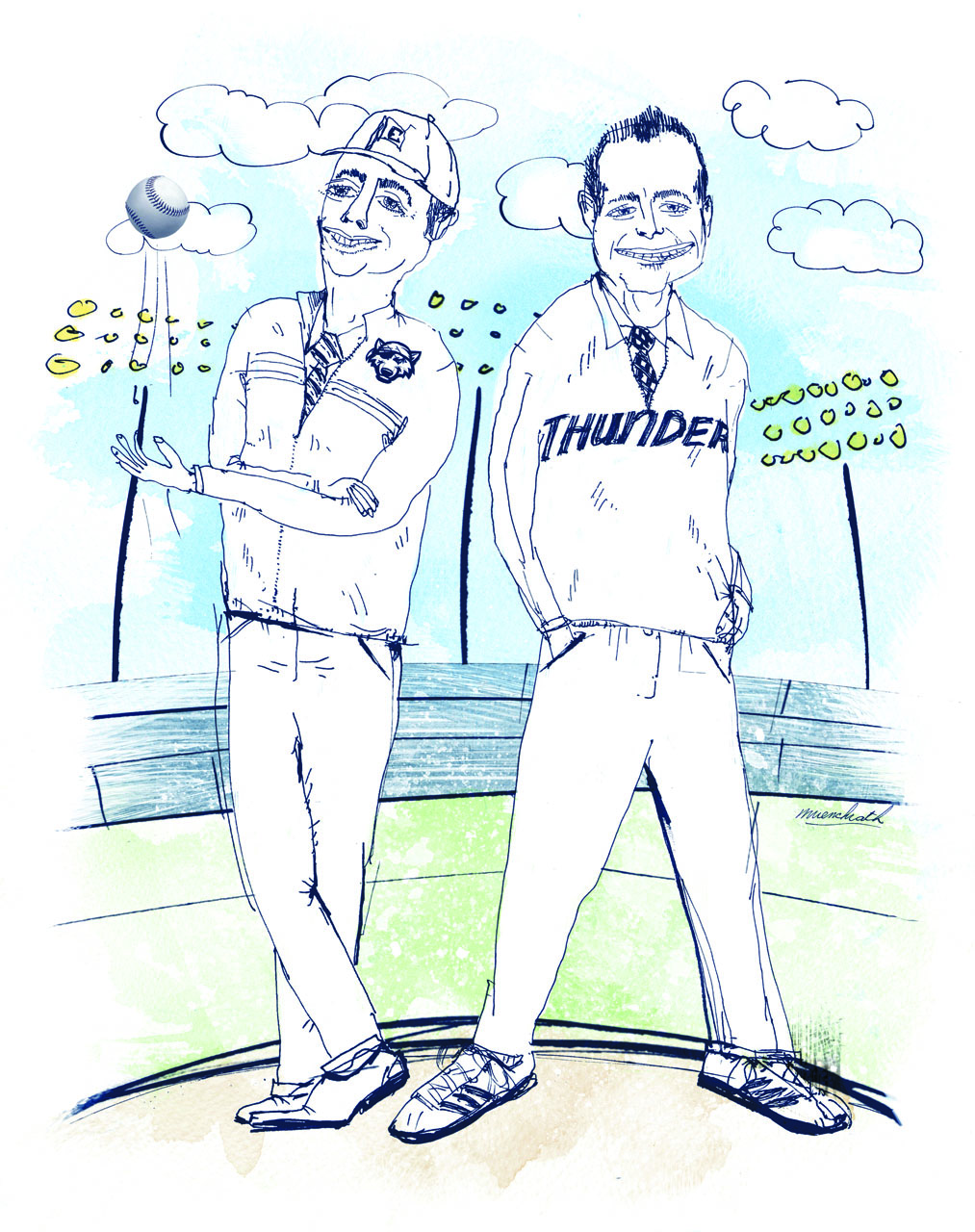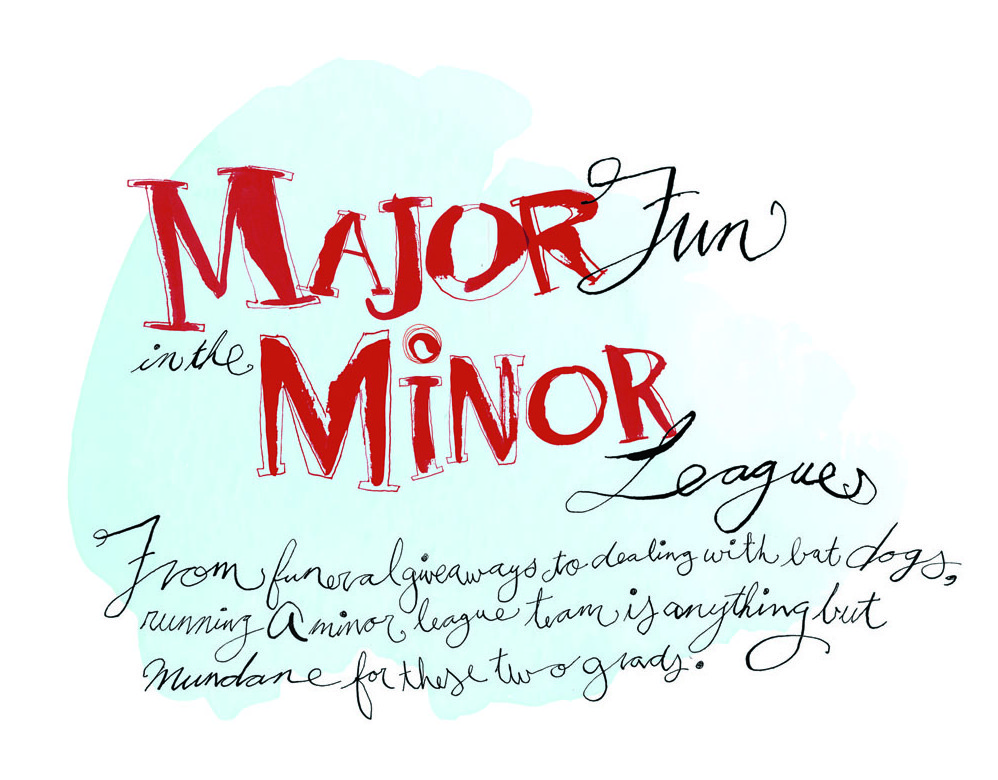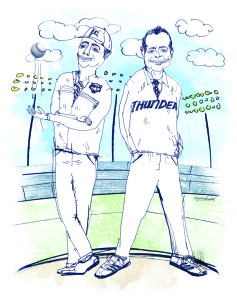Major Fun in the Minor Leagues
From funeral giveaways to dealing with bat dogs, running a minor league team is anything but mundane for these two grads.


 It’s about as unlikely as a 10-run, two-out rally in the bottom of the ninth: two guys who graduated from the same college—in the same year—running two of the 30 Class AA minor league baseball teams in North America. But that’s the reality for Greg Coleman and Will Smith, 1996 grads with Double-A teams to call their own. Coleman took over as president of the Erie SeaWolves, a Detroit Tigers farm club, in 2011, while Smith has been general manager and chief operating officer of the Yankees affiliate Trenton Thunder since 2008. We recently got them on the phone together to talk about their career paths, what inspires them, and their most creative ballpark promotions. Given the all-in-this-together nature of minor league baseball, they’re more colleagues than competitors—unless, of course, mascot bragging rights are at stake.
It’s about as unlikely as a 10-run, two-out rally in the bottom of the ninth: two guys who graduated from the same college—in the same year—running two of the 30 Class AA minor league baseball teams in North America. But that’s the reality for Greg Coleman and Will Smith, 1996 grads with Double-A teams to call their own. Coleman took over as president of the Erie SeaWolves, a Detroit Tigers farm club, in 2011, while Smith has been general manager and chief operating officer of the Yankees affiliate Trenton Thunder since 2008. We recently got them on the phone together to talk about their career paths, what inspires them, and their most creative ballpark promotions. Given the all-in-this-together nature of minor league baseball, they’re more colleagues than competitors—unless, of course, mascot bragging rights are at stake.
Minor league baseball is probably unique among American sports in that winning games really isn’t your top priority. What do you see as your primary goal in running these teams?
Greg Coleman: We want to put out a quality product, but we define that differently than our major league partners might. We’re trying to create an environment that’s welcoming, fun, affordable family entertainment.
Will Smith: Affordable family entertainment—that’s how I always answer. Some people aren’t aware of where the relationship with major league clubs begins and ends. I say, “We’re in control of everything outside the white lines.” Everything on the field of play, the major league clubs are in control. Outside the lines, we make sure the hot dogs are hot, the beer is cold, and the kid zone is clean and fun.
That’s obviously the appeal for many minor league fans, as well. Does that have an impact on how much attention you pay to the game?
Smith: We always say—and I know Greg’s heard this before—that we’re a marketing company with a game going on in the background.
Coleman: My first year in baseball, ’98, I worked with the Daytona Cubs, and the coolest part of my day every day was driving to the ballpark. You’d pinch yourself: I’m going to work at a ballpark. Over time, that changes, and it becomes a little bit less about the game, but you always try to appreciate it.
Smith: It depends on the time of year, too. It might be April, late on a Wednesday night, a 4-4 game with a few hundred fans here, and you really do pay attention. But in the middle of summer, it gets so crazy with everything else going on, you might not even catch a pitch.
For the players, the minors are a necessary stepping-stone to the big leagues. Is it the same for you guys—did you get into this dreaming of running a major league club?
Coleman: I wanted to be general manager of the Boston Red Sox. But then you learn things about the business, learn things about yourself, and honestly, I don’t have an interest in running a major league team at this point. I love the fact that you can make a difference, and I think that becomes harder to do in a larger city. The minor league side is where it’s at for me.
Smith: Well, I went to school for mechanical engineering, but I wasn’t a very good mechanical engineer. (Laughs) So I went down to the job fair at baseball’s winter meetings, did a little bit of homework, applied to a bunch of places, and finally got my start in New Haven, Connecticut, in 2001. Like Greg said, getting into the small business world, you really have the ability to make memories.
The minors are famous for their unusual, often quirky, promotions. What have you come up with that you’re most proud of?
Smith: Greg’s more creative than me, so I’ll let him start.
Coleman: A promotion that’s made the rounds was our What Could’ve Been Night. When we started the team in Bowling Green, Kentucky, the contest to name the team came down to a few choices, and it ended up being the Hot Rods; they make Corvettes in Bowling Green. But there was a polarizing finalist: the Cave Shrimp, because there are these sightless albino shrimp that live in caves down there. Well, people were passionate about it—they either loved it or hated it. So we got the idea that we’d play one game as the Bowling Green Cave Shrimp, and then we had the idea of the butterfly effect: If one thing changed, what else would change in the world? We brought it to life through the video board, and it was fantastic. It won us a promotion of the year award, and it was great to see people take what we did and come up with their own spin on it.
Smith: That’s a lot of what we do in this industry. We’re very segmented markets, 160 minor league teams across the country, so we go to these promotional seminars, share these ideas, and then bring them back to our markets. When I was in Hagerstown, Maryland, years ago, we gave away a funeral—a prepaid, preplanned funeral—and it got all kinds of press. A couple of years later, somebody did it in another market, and it got the same kind of national press. We’re all swiping these ideas, and it works out really well.
What about a promotion gone wrong?
Coleman: Well, one that’s more about execution than a bad idea: When I was in Modesto, California, we did a seat cushion giveaway sponsored by the county’s tobacco-free coalition. It’s the day before the game, and the seat cushions aren’t there. Turns out they’re at a warehouse 20 minutes away. So we go down the next morning, and somebody tells us, “The stuff is on a truck. I can’t unload that truck, but I can unlock it, and you can take what you need.” I’ve got almost my entire staff, it’s 100 degrees, and we’re unloading this truck. We get about halfway through the truck before we get to our first box—we’re pulling off lamps, tires, you name it. We’re on the fifth box, and our assistant GM says, “I’ve got to see what these look like.” He rips open the box, pulls one out, and the print was supposed to read “The Butt Stops Here.” Something got messed up in the proofreading, because it read “The Butt Shops Here.” We ended up gluing them face-to-face, so when someone came and said their seats were too hot, we had a nice, thick cushion for them.
Smith: We used to do a lot of kitschy promotions, and we didn’t have a lot of resources. We did an Asterisk Night around the time Barry Bonds was closing in on the home run record. We also did Bode Miller’s Guaranteed Loss Night—the Olympic skier, after he was supposed to perform really well at the Olympics. We drew comparisons with the Buffalo Bills, famous sports losers, and we put it out there. Then we got a call from an agency representing Bode Miller. They weren’t happy and were threatening to sue. I didn’t know where to run, and ultimately we kind of backtracked.
Will, in happier news, the Thunder does have the cutest unofficial mascot in all of baseball.
Smith: Yeah, the Bat Dogs. There are a lot of these rotating acts that go around the minors from team to team, and there’s one called Jake the Diamond Dog. He came here, everybody loved it, and our former GM thought, “Well, if everybody loved it….” So we got Chase That Golden Thunder, a golden retriever, who started in 2002. His son, Derby, was born in 2008, and Derby had offspring last year, so now we have Rookie. They go out, sit where the batboys sit, deliver water to the umpires. They’re tremendous marketing material. We didn’t have money to buy a dog in Hagerstown, so we made fun of Bode Miller.
Coleman: We don’t have a dog, although when they did breed Derby recently, I let Will know I’d be interested in bringing one of Derby’s kids to Erie. But the litter was pretty small, right?
Smith: Yeah, just two pups. I love having the dog, I think all teams should have one, but it’s hard. The GM who was here at the time left, and the dog lived with him, and he wanted to take the dog with him. But the dog was property of the Trenton Thunder, so he stayed. To this day, we have a guy who takes care of two dogs, feeds them, brings them to work every day.
Coleman: It’s funny, you said the teams really don’t compete, but we do compete in some ways. In 2013, we were voted the Eastern League’s top mascot, C. Wolf—we’re the SeaWolves, super creative, right? Well, in 2014, Trenton’s puppy beat us. Because who doesn’t love a puppy?
Illustrations by Darcy Muenchrath
Posted on July 13, 2015

